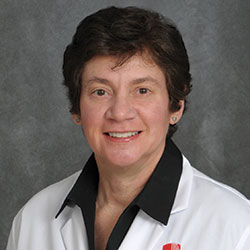By Thomas Crocker
Alison Stopeck, MD, Division Chief of Hematology/Oncology and Associate Director of Clinical and Translational Research at Stony Brook Cancer Center, is dedicated to revolutionizing breast cancer treatment and prevention through ongoing clinical research.

Medical school: Columbia University College of Physicians & Surgeons
Residency: Columbia Presbyterian Medical Center
Fellowship: Cornell University Medical College
Q: What are your current areas of focus in breast cancer research?
A: Much of my research is focused on the tumor microenvironment and making it less permissive to cancer — to prevent cancer from developing or escaping and making it more sensitive to anti-tumor therapies. We’re looking at novel ways to affect this microenvironment and how immunotherapy changes it. A lot of my research also incorporates novel imaging technology, which is noninvasive, has no risks to the patient and provides further insights into the cancer’s biology.
Initially, cancer research focused on finding ways to stop cancer cells from growing. Then, we got smarter because cancer cells are smart and find ways to keep mutating. We started targeting specific pathways to reduce the chances that cells will spread and resist therapy.
Q: How does cancer prevention play a part in your research?
A: Prevention is a very important element of our research. While patients are heavily screened for breast cancer on Long Island, there is still a high incidence of the disease here. It is the second leading cause of cancer deaths in the U.S. for women, and it can have many long-lasting effects, even after remission. These include toxicities from treatment including chemo brain, hot flashes and post-traumatic stress disorder from having the cancer or the fear that it might come back. Of course, the best way to avoid the effects of treatment is to prevent cancer altogether.
Because breast density is among the strongest and most common risk factors for developing cancer, we are looking at ways to change the collagen structure of the breast. We are actively recruiting patients for a National Cancer Institute-sponsored trial examining whether the anti-inflammatory drug sulindac reduces breast density in postmenopausal women at increased risk of cancer.
Q: What other clinical trials are currently taking place at Stony Brook Cancer Center for patients with breast cancer?
A: We have about 20 open trials at any given time, and we have trials open for all stages of cancer. Many are targeted to high-risk, metastatic cancers. We have trials focused on refractory breast cancer resistant to immunotherapy, and we try to do trials that involve comparing a novel agent with the current standard of care.
Another area we are focused on is treatment de-escalation. In oncology, the belief has been that more is better. However, now we are finding that sometimes less is more, and we don’t always need the most intense therapy to cure patients. We are looking at de-escalation for patients who may need less chemotherapy and radiation; for example, we currently have a trial that evaluates the outcomes of giving less or no radiation after lumpectomy surgery.
For more information on open clinical trials at Stony Brook Cancer Center, visit cancer.stonybrookmedicine.edu/CancerResearch/ClinicalTrials.
Source: MD News April 2022, Long Island Edition
